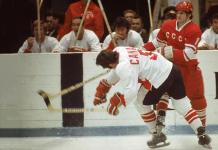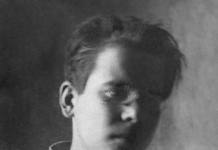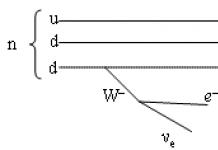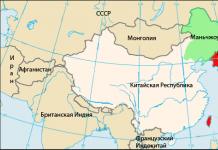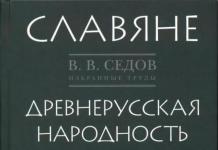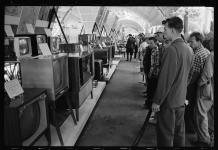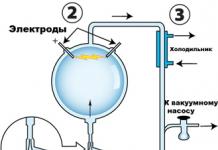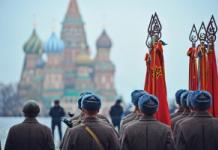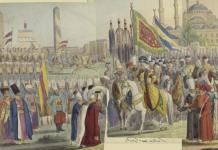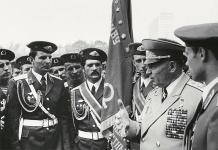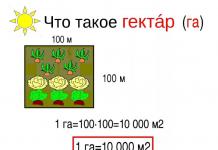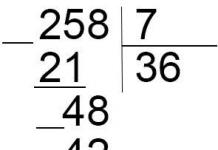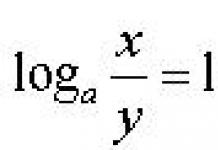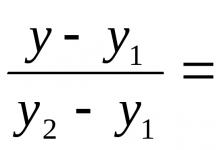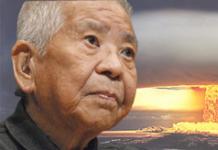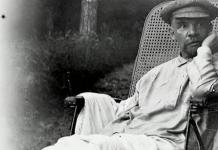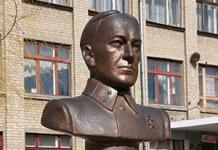This man is hardly remembered now. The younger generation probably already does not know his name. But it is precisely on such examples that these very young people must be educated. If you want to grow up diehard heroes, not amorphous consumers of carbonated drinks.
Let's remember our Russian heroes. They deserve it. Only in this way will the connection between generations be preserved.
The name of the man who has become a symbol of the unyielding will of the Russian officer, fortitude and courage is Dmitry Mikhailovich Karbyshev. The hero of the USSR.
Already in the Soviet school little was said about him. The Nazis tortured General Karbyshev by pouring cold water on him in winter. That's all that the average student of the USSR knew about him. Today's schoolchildren practically do not know Karbyshev. There are, of course, exceptions ...
11.04. 2011 “A public rally dedicated to the International Day for the Liberation of Prisoners of Fascism was held in Vladivostok. About a hundred members of the city and regional organizations of former prisoners, veterans, representatives of the city administration, military personnel, schoolchildren and students gathered at the monument to the hero of the Soviet Union Dmitry Karbyshev. "
Do your children know this last name? Correct this gap. Tell your children about Dmitry Mikhailovich Karbyshev ...
He was born on October 14, 1880 in Omsk in the family of a military official. In 1908 he entered the Military Engineering Academy, and after graduating from it, he became one of the best Russian military engineers.
During the First World War, he supervises work in the Brest Fortress. During the siege of the Russian fortress of Przemysl, he personally leads a consolidated company into the attack and is wounded. Awarded with the order and received the rank of lieutenant colonel.
But it was not in the fratricidal war that Dmitry Mikhailovich performed his feat, for which he is worthy of the memory of his descendants. After the Civil War, Karbyshev works under the supervision of M.V. Frunze, teaches engineering at the Academy, writes dozens of works on various branches of military engineering. Receives the title of professor and the degree of Doctor of Military Sciences.
By the beginning of the Great Patriotic War, Lieutenant-General Karbyshev was the leading military engineer of our country. On June 8, 1941, he was on a business trip in Belarus, practically at the border. When the war began, he was offered to return to Moscow, they offered to provide transport and security. The 61-year-old general refuses and retreats with units of the Red Army. Wounded and shell-shocked, he is taken prisoner.
General Karbyshev spent three and a half years in Nazi dungeons. Concentration camps change one by one: Zamosc, Ostrov-Mazowiecki, Hammelsburg near Berlin. Hunger, beatings, illness. And offers from the Germans. To the captured old Russian officer, the Germans offer cooperation.
“Yesterday I was offered to go to serve in the German army,” Karbyshev told his cellmates.
An elderly general, constantly ill, physically weak, but incredibly strong in spirit, not only endures all the horrors of the German concentration camps, but also campaigns. Convincing others to sabotage work. Convinces to believe in the victory of Russia.
He is again offered to betray his homeland. He refuses again.
And so the Nazis send him to the Nuremberg camp. Then to the Nuremberg prison of the Gestapo. From there, the general is sent to the quarries, to the Flossenburg concentration camp. This is a real hard labor, multiplied by sadism and murder. Karbyshev is already 64 years old ...
Then Dmitry Mikhailovich is sent to Majdanek. Then he goes to Auschwitz. These are death camps. This is the most horror of the Nazi empire of death. In Auschwitz, the general walks in the striped clothes of a prisoner, barely dragging his feet from hunger, on which they are wearing wooden shoe-shoes.
An officer who knew Karbyshev by sight meets him at Auschwitz. The Russian general was sent to a team that cleaned out latrines and cesspools. From the unexpectedness of the meeting, the officer was confused and asked a stupid question:
How do you feel in Auschwitz?
Karbyshev bowed and answered:
- Well, cheerfully, like in Majdanek.
In February 1945, Dmitry Mikhailovich Karbyshev was sent to the Mauthausen death camp. In 1948, a monument to the hero was opened there ...
MESSAGE OF FORMER POW-OF-PRIOR COLONEL SOROKIN
(1945 year)
 On February 21, 1945, I arrived at the Mauthausen concentration camp with a group of 12 captured officers. Upon arrival at the camp, I learned that on February 17, 1945, at 17 o'clock in the afternoon, a group of 400 people was allocated from the total mass of prisoners, which included Lieutenant General Karbyshev. These 400 people were stripped naked and left standing in the street; the weak died, and they were immediately sent to the furnace of the camp crematorium, while the rest were driven with truncheons under a cold shower. Until 12 o'clock at night, this execution was repeated several times.
On February 21, 1945, I arrived at the Mauthausen concentration camp with a group of 12 captured officers. Upon arrival at the camp, I learned that on February 17, 1945, at 17 o'clock in the afternoon, a group of 400 people was allocated from the total mass of prisoners, which included Lieutenant General Karbyshev. These 400 people were stripped naked and left standing in the street; the weak died, and they were immediately sent to the furnace of the camp crematorium, while the rest were driven with truncheons under a cold shower. Until 12 o'clock at night, this execution was repeated several times.
At 12 o'clock in the morning, during another such execution, comrade Karbyshev deviated from the pressure of cold water and was killed by a blow to the head with a truncheon. Karbyshev's body was burned in the camp crematorium.
REPATRIATION COMMITTEE MESSAGE
(1946)
Our repatriation representative in London, Major Sorokopud, on February 13, 1946, was invited by the ailing Major of the Canadian Army, Seddon de Saint Clair, to Bremshot Hospital, Hampshire (England), where the latter informed him:
“In January 1945, among 1,000 prisoners from the Heinkel plant, I was sent to the Mauthausen extermination camp, this team included Lieutenant General Karbyshev and several other Soviet officers. Upon arrival at Mauthausen, I spent the whole day in the cold. In the evening, a cold shower was arranged for all 1000 people, and after that they were built on the parade ground in the same shirts and stocks and held until 6 o'clock in the morning. Of the 1,000 people who arrived at Mauthausen, 480 died. General Dmitry Karbyshev also died. "
P.S. Hopefully, a film will be made about General Karbyshev. And if one already exists, it will be shown on one of the leading channels. Artists, ay? You are deeply indebted to your people ...
(Information from the book: "Soldier, hero. Scientist. Memories of DM Karbyshev",
Military publishing house of the USSR Ministry of Defense, Moscow, 1961)
Today, few people from the generation of 20 years old and younger will be able to tell something intelligible about the legendary Soviet hero - Dmitry Mikhailovich Karbyshev. His surname is widely heard, mainly because of the large number of streets named after him in the cities of the post-Soviet space, institutions named after him (for example, schools) are less common, but these are just the remaining fragments of that legend about a man whose fate was known once upon a time to every pioneer in any corner of the USSR ...
Dmitry Karbyshev was born on October 26, 1880 in Omsk in the family of a military official. At a young age, Dmitry was left without a father, however, he decided to follow in his footsteps and in 1898 he graduated from the Siberian Cadet Corps, and two years later - St. Petersburg Nikolaevskoe military engineering school... After graduating from the school, Karbyshev, with the rank of second lieutenant, was appointed to serve as a company commander in the 1st East Siberian Sapper Battalion, which was located in Manchuria.
Dmitry Karbyshev took part in the Russian-Japanese war: as part of his battalion, he fortified positions, was engaged in building bridges and installing communications equipment. He proved himself to be a brave officer in the battles of Mukden, and it is not surprising that in two years of this war Karbyshev received five orders and three medals.
In 1906, Dmitry Karbyshev was fired from the army into the reserve: according to documented sources, for agitation among the soldiers during that turbulent revolutionary time. A year later, however, Karbyshev was again called up to serve as a company commander of a sapper battalion: his knowledge and experience were useful when rebuilding fortifications in Vladivostok.
After graduating with honors from the Nikolaev Military Engineering Academy in 1911, Dmitry Mikhailovich was assigned to Brest-Litovsk, where he took part in the construction of the forts of the Brest-Litovsk Fortress.
Karbyshev meets the First World War as part of the 8th Army of General A.A. Brusilov, which fought in the Carpathians. In 1915, Karbyshev was one of the actively attacking the fortress of Przemysl; in battles he was wounded in the leg. For the heroism shown in these battles, Karbyshev receives the Order of St. Anna with swords and is promoted to lieutenant colonel.
Dmitry Karbyshev joined the Red Guard in December 1917, from the next year he was already part of the Red Army. During the Civil War, Karbyshev helped to strengthen military positions throughout the country - from Ukraine to Siberia. Since 1920, Dmitry Mikhailovich has been the engineer chief of the 5th Army of the Eastern Front, a little later he was appointed assistant to the chief of engineers of the Southern Front.
After the Civil War, Karbyshev taught at the Frunze Military Academy, since 1934 he has been working as a teacher at the Military Academy of the General Staff. Karbyshev was popular among the students of the Academy. Here is what General of the Army Shtemenko recalls about him: "... from him came the favorite saying of the sappers:" One sapper, one ax, one day, one stump. " True, it was altered by witches, in Karbyshev's way it sounded like this: "One battalion, one hour, one kilometer, one ton, one row."
In 1940, Karbyshev with the rank of Lieutenant General of the Engineering Troops, and in 1941 he was awarded the degree of Doctor of Military Sciences (he penned more than a hundred scientific papers on military engineering and military). His theoretical manuals on engineering support during combat operations and the tactics of engineering troops were considered fundamental materials in the training of Red Army commanders before the Great Patriotic War.
Dmitry Karbyshev took part in the Soviet-Finnish war of 1939-1940, developed recommendations for engineering support for the breakthrough of the Mannerheim line.
The beginning of the Great Patriotic War found Karbyshev at the headquarters of the 3rd Army in the city of Grodno. Dmitry Mikhailovich is offered to allocate transport and personal protection to return to Moscow, however, he refuses, preferring to retreat together with units of the Red Army. Once surrounded and trying to get out of it, Karbyshev was seriously wounded in a fierce battle (near the Dnieper, in the Mogilev region), and was captured by the Germans in an unconscious state.
From this moment begins the three-year history of the Karbyshev captivity, his wanderings through the Nazi camps.
 In Nazi Germany, Karbyshev was well known: already in 1940, the IV department of the RSHA of the Imperial Security Directorate opened a special dossier on him. The dossier had a special mark and passed under the accounting category "IV D 3-a", which meant, in addition to monitoring activities, to apply special treatment in case of capture.
In Nazi Germany, Karbyshev was well known: already in 1940, the IV department of the RSHA of the Imperial Security Directorate opened a special dossier on him. The dossier had a special mark and passed under the accounting category "IV D 3-a", which meant, in addition to monitoring activities, to apply special treatment in case of capture.
He began his camp "journey" in the Polish town of Ostrov-Mazowiecki, where he was sent to a distribution camp. Soon Karbyshev was sent to the camp of the Polish town of Zamosc, Dmitry Mikhailovich was settled in barrack No. 11 (later called the general's). The Germans' calculation that after the hardships of camp life, Karbyshev would agree to cooperate with them, was not justified, and in the spring of 1942 Karbyshev was transferred to an officer's concentration camp in the city of Hammelburg (Bavaria). This camp, consisting purely of a contingent of Soviet prisoner officers and generals, was special - the task of its leadership was to persuade the prisoners to cooperate with Nazi Germany by any means. That is why certain norms of legality and humane treatment were observed in its atmosphere. However, these methods did not work for Dmitry Karbyshev, it was here that his motto was born: “There is no greater victory than victory over oneself! The main thing is not to kneel before the enemy. "
Since 1943, a former officer of the tsarist Russian army Pelit has been conducting "preventive work" with Karbyshev (it is noteworthy that this Pelit once served with Dmitry Mikhailovich in Brest). Colonel Pelita was warned that the Russian military engineer was of particular interest to Germany, and therefore every effort should be made to attract him to the side of the Nazis.
The subtle psychologist Pelit got down to business with a reason: playing the role of a seasoned warrior, far from politics, he described to Karbyshev all the advantages of going over to the German side (fantastic in nature). Dmitry Mikhailovich, however, immediately saw through the cunning of Pelita and stood his ground: I do not betray my homeland.
The Gestapo command decides to use slightly different tactics. Dmitry Karbyshev was taken to Berlin, where he was organized a meeting with Heinz Raubenheimer, a famous German professor and expert in fortification engineering. In exchange for cooperation, he offers Karbyshev conditions for work and living in Germany, which would make him an almost free person. Dmitry Mikhailovich's answer was exhaustive: “My beliefs do not fall out with my teeth from a lack of vitamins in the camp diet. I am a soldier and remain true to my duty. And he forbids me to work for the country that is at war with my Motherland. "
After such a firm refusal, tactics in relation to the Soviet general-prisoner of war changed again - Karbyshev was sent to the Flossenbürg concentration camp, a camp famous for its hard labor and truly inhuman conditions in relation to prisoners. The six-month stay of Dmitry Karbyshev in the hell of Flossenburg ended with his transfer to the Nuremberg Gestapo prison. After which the camps, where Karbyshev was assigned, began to spin in a gloomy carousel. Auschwitz, Sachsenhausen, Mauthausen - these truly nightmarish death camps, through which Karbyshev also had to go and in which, despite the inhuman conditions of existence, he remained a strong-willed and unbending person until his last days.
Dmitry Mikhailovich Karbyshev died in the Austrian concentration camp Mauthausen: he froze, being doused with water in the cold ... He died heroically and martyrically, without betraying his Soviet Motherland.
The details of his death became known from the words of Major of the Canadian Army Seddon De St. Clair, who also passed Mauthausen. This was one of the first reliable information about Karbyshev's life in captivity - after all, he was then considered missing in the USSR at the very beginning of the war.
In 1946, Dmitry Karbyshev was posthumously awarded the title of Hero of the Soviet Union. And on February 28, 1948, a monument and a memorial plaque were unveiled at the site of the former Mauthausen concentration camp, where Lieutenant General Karbyshev was savagely tortured.
The famous words of General Dmitry Mikhailovich Karbyshev, said to the fascist executioners: “I don’t trade in conscience and homeland” ... His fortitude and courage amaze the imagination, his feat is immortal in the eyes of his contemporaries.
Biography
Dmitry Mikhailovich was born on October 26, 1880 in a military family, from the nobility. He went through the Russian-Japanese and the First World War. In 1917 he joined the Red Army, was a military engineer. He met the Great Patriotic War as a lieutenant general, doctor of military sciences. On August 8, 1941, during an attempt to break through the encirclement, he was wounded and captured.
Date of birth: October 14 (26), 1880.
Place of birth Omsk, Russian Empire
Died: 18 February 1945 (64 years old)
Place of death: Mauthausen concentration camp.
Type of troops: Engineering troops.
Rank: Lieutenant General.
Doctor of military sciences, professor.
Battles and wars: Russian-Japanese War, World War I, Civil War in Russia, Soviet-Finnish War, Great Patriotic War.
In captivity
Realizing who they managed to capture, the Germans immediately decided to recruit a prominent military specialist. All methods were used, from bribery and the promise of a well-fed and comfortable life, to sophisticated bullying. Karbyshev was not fed, he was kept in a cell with such a bright light that it was impossible to sleep. The result was intolerable insomnia, terrible suppuration of the eyes, and missing teeth.
Karbyshev, already a middle-aged man, was adamant:
"My beliefs don't fall out with my teeth."
After that, the recruiters wrote in the dossier: "... This largest Soviet fortifier, a career officer of the old Russian army, a man over sixty years old, turned out to be fanatically devoted to the idea of loyalty to military duty and patriotism ... Karbyshev can be considered hopeless in terms of being used as a specialist in military engineering in our country."
Then the real hell of concentration camps began, of which there were about a dozen. But Dmitry Mikhailovich did not lose courage until his death. According to the recollections of one officer who was with Karbyshev in Auschwitz, he asked the general a stupid question: "How do you feel in Auschwitz?"... Karbyshev bowed and answered: "Well, cheerfully, like in Majdanek"... And when he worked in the team for the preparation of gravestones, he mentioned that this work gives him real pleasure:
- The more we have to make tombstones, the better, which means that ours are doing at the front.

General Karbyshev died on February 18, 1945 in the Mauthausen concentration camp (Austria). He, along with other prisoners (about 500 people), was taken to the parade ground and doused in the cold with cold water from fire hoses. Blue people fell one by one. Dmitry Mikhailovich held out for a very long time and until the last supported those who stood around:
- Cheer up comrades! Think about the Motherland and courage will not leave you!
Awards
General Karbyshev was repeatedly awarded the highest medals and orders, moreover, he had awards from different eras, both before 1917 and after.
Russian empire
- Order of St. Anne II degree.
- Order of St. Stanislaus II degree.
- Order of St. Anne III degree.
- Order of St. Stanislaus III degree.
- Order of St. Anne IV degree.
the USSR
- The hero of the USSR.
- The order of Lenin.
- Order of the Red Banner.
- Order of the Red Star.
The title of Hero of the Soviet Union was awarded to General Karbyshev posthumously (February 28, 1948).
Comedy Women
In our time, there are scum who defame the memory of heroes with their jokes for degenerates. The collective of jesters from Comedy Vumen especially distinguished themselves. The whole society was outraged by Natalia Medvedeva's silly joke, which sounded in one of their shows.
In fairness, we must admit that Natalia Medvedeva apologized for this joke, calling everything that they, as artists, are forced people, they have no brains, therefore they are told what their masters need to do from the TV channels. Natalia apologized on her Instagram:
“I sincerely apologize for the issue in Comedy Wuman 2013, where the name of the great general was mentioned. At that time, I sincerely thought that this surname was fictitious. Sincerely. Truth. Excuse me ... All actresses (and this is no secret) sign a contract according to which they pronounce the text that they are given ... I confess that at that moment I sincerely thought that this was a fictional character and did not compare it with the real one. a historical fact, once again I sincerely ask for your petition. "
We remember and are proud!

Dmitry Mikhailovich Karbyshev became the main example for subsequent generations of Soviet and Russian society.
Despite all the dirt that is being poured on the USSR, on the feat of our people in the bloody War, we remember, we are proud, we live!
Video
"I am a soldier and will remain faithful to my duty", "... The main thing is not to kneel before the enemy"- Hero of the Great Patriotic War Dmitry Mikhailovich Karbyshev (1880‒1945).
Dmitry M. Karbyshev
October 26, 1880
It is a symbol of fortitude and courage for several generations of Soviet people.
His martyrdom made him immortal forever.
Dmitry Mikhailovich Karbyshev was born on October 26, 1880 in the very center of Russia, in the city of Omsk, in the family of a military official.
Lost his father early. The children were raised by their mother. Despite the great difficulties of a material nature, Karbyshev brilliantly graduated from the Siberian Cadet Corps and in 1898 was admitted to the St. Petersburg Nikolaev Military Engineering School.
Participated in the Russo-Japanese War. As part of the battalion, he fortified positions, established communications, built bridges, conducted reconnaissance in force. He was awarded five orders and three medals.
After the war he served in Vladivostok. In 1911 he graduated with honors from the Nikolaev Military Engineering Academy. On assignment he was sent to Brest-Litovsk, where he took part in the construction of the Brest Fortress.
From the first day he took part in the First World War. He fought in the Carpathians as part of the 8th Army of General A.A. Brusilov. In 1916 he took part in the famous Brusilov breakthrough.
In December 1917, Dmitry in Mogilev-Podolsk. Karbyshev joined the Red Guard. Since 1918 in the Red Army. During the Civil War, he took part in the construction of many fortified areas, worked in engineering support.
In 1921-1936 he served in the engineering troops, was the chairman of the Engineering Committee of the Main Military Engineering Directorate of the Red Army. In 1938 he graduated from the Military Academy of the General Staff and was approved as a professor. In 1940 he was awarded the rank of Lieutenant General of the Engineering Troops. In 1941 he received a doctorate in military sciences. Member of the Soviet-Finnish war.
In early June 1941, General Karbyshev was sent to the Western Special Military District. The Great Patriotic War found him at the headquarters of the 3rd Army in Grodno.
On June 27, the army headquarters was surrounded. In August 1941, while trying to get out of the encirclement, Lieutenant General D.M. Karbyshev was seriously wounded in battle and was taken prisoner in an unconscious state.
The Nazis repeatedly tried to persuade Dmitry Mikhailovich to treason. An excellent specialist, a military scientist with great experience, moreover, a general, he was of great interest to the Nazis. However, all their attempts were in vain.
Karbyshev was held in German concentration camps: Zamosc, Hammelburg, Flossenbürg, Majdanek, Auschwitz, Sachsenhausen and Mauthausen. Despite his age (and he was already over sixty) he was one of the active leaders of the camp resistance movement. On the night of February 18, 1945, in the Mauthausen concentration camp, he was doused with water in the cold and died. Became a symbol of unbending will and perseverance.
On August 16, 1946, Dmitry Mikhailovich Karbyshev was posthumously awarded the title of Hero of the Soviet Union.
There was a time when any student in a Soviet school could tell who General Dmitry Karbyshev was and for what he was awarded the title Hero of the Soviet Union. Alas, we are increasingly losing not only the memory of the people who gave the most precious thing a person can have - life, for the freedom of their country, but also the feeling of gratitude to the true heroes. So, who was he - the General of the Red Army Dmitry Karbyshev, a participant in the Great Patriotic War, a prisoner of war who was martyred in the Mauthausen concentration camp.
Biography of General Karbyshev briefly
Karbyshev was born on October 26, 1880 in Omsk, in the family of a hereditary military man, and his career was a foregone conclusion. He graduated from the cadet corps, a military engineering school and, with the rank of second lieutenant, went to the eastern borders, to Manchuria. There he was found by the Russian-Japanese war, for his participation in which he was awarded five military orders and three medals, which is a confirmation of his personal courage. In the tsarist army, awards for "beautiful eyes" were not given. In 1906, Dmitry Karbyshev, the lieutenant was dismissed from the army to the reserve for "unreliability" after the officer's court of honor. But, literally a year later, the military department returned an experienced and efficient officer to participate in the restructuring of the fortifications of Vladivostok.
In 1911, Karbyshev graduated with honors from the Nikolaev Military Engineering Academy and was assigned to Sevastopol, but ended up in Brest-Litovsk. Few people know that Dmitry Mikhailovich took part in the construction of the famous Brest Fortress. During the First World War, he fought under the command of General Brusilov, participated in his famous breakthrough and storming of the Przemysl fortress. Was awarded and promoted to lieutenant colonel.
Service in the Red Army
After the October Revolution, he joined the Red Guard and was engaged in the construction of fortifications on various fronts of the Civil War - in the Urals, in the Volga region, in the Ukraine. He was personally acquainted with Kuibyshev and Frunze, who appreciated the former tsarist colonel and trusted him, met with Dzerzhinsky. Karbyshev was entrusted with leading the creation of defensive structures around Samara, which were later used as a springboard for the Red Army's offensive. After the Civil War, he began teaching at the Military Academy. Frunze, and in 1934 he headed the department of military engineering at the Academy of the General Staff.
Among the students of the academy, Dmitry Mikhailovich was very popular, which was later recalled by General of the Army Shtemenko. Karbyshev owned a proverb about the importance of engineer troops - “One battalion, one hour, one kilometer, one ton, one row.” By the beginning of World War II, Karbyshev had a professor's degree, defended his doctoral dissertation, he was awarded the rank of lieutenant general of engineering troops, and he became a member of the CPSU (b). The beginning of the war found Karbyshev on the western border in Belarus. Trying to get out of the encirclement, he is seriously wounded and taken prisoner.
The feat of the Russian general
For several years Moscow did not know anything about the fate of the general. He was reported missing. Only in 1946 the details of the last days of the life of the Soviet general became known from Major of the Canadian Army Seddon De Saint-Clair. This happened in mid-February 1945. A large party of prisoners of war from other camps was driven into the Mauthausen concentration camp. Among them was General Dmitry Mikhailovich Karbyshev. The Germans forced the people to undress and began to pour cold water on them from cannons. Many fell from a broken heart, and those who dodged were beaten with clubs. Karbyshev encouraged those next to him, already covered with ice. "The Motherland will not forget us" - the last words of the general before falling. His body, like the bodies of the others, was burned in the crematorium furnace.
Later, from the German archives, it became known that Karbyshev had received offers from the German command for cooperation many times, but he never gave his consent. The noble memory of the heroic death of a Soviet man, General Dmitry Mikhailovich Karbyshev, who did not become a traitor to the Motherland, did not lose his human dignity and the honor of an officer, must be preserved in the history of our country.

